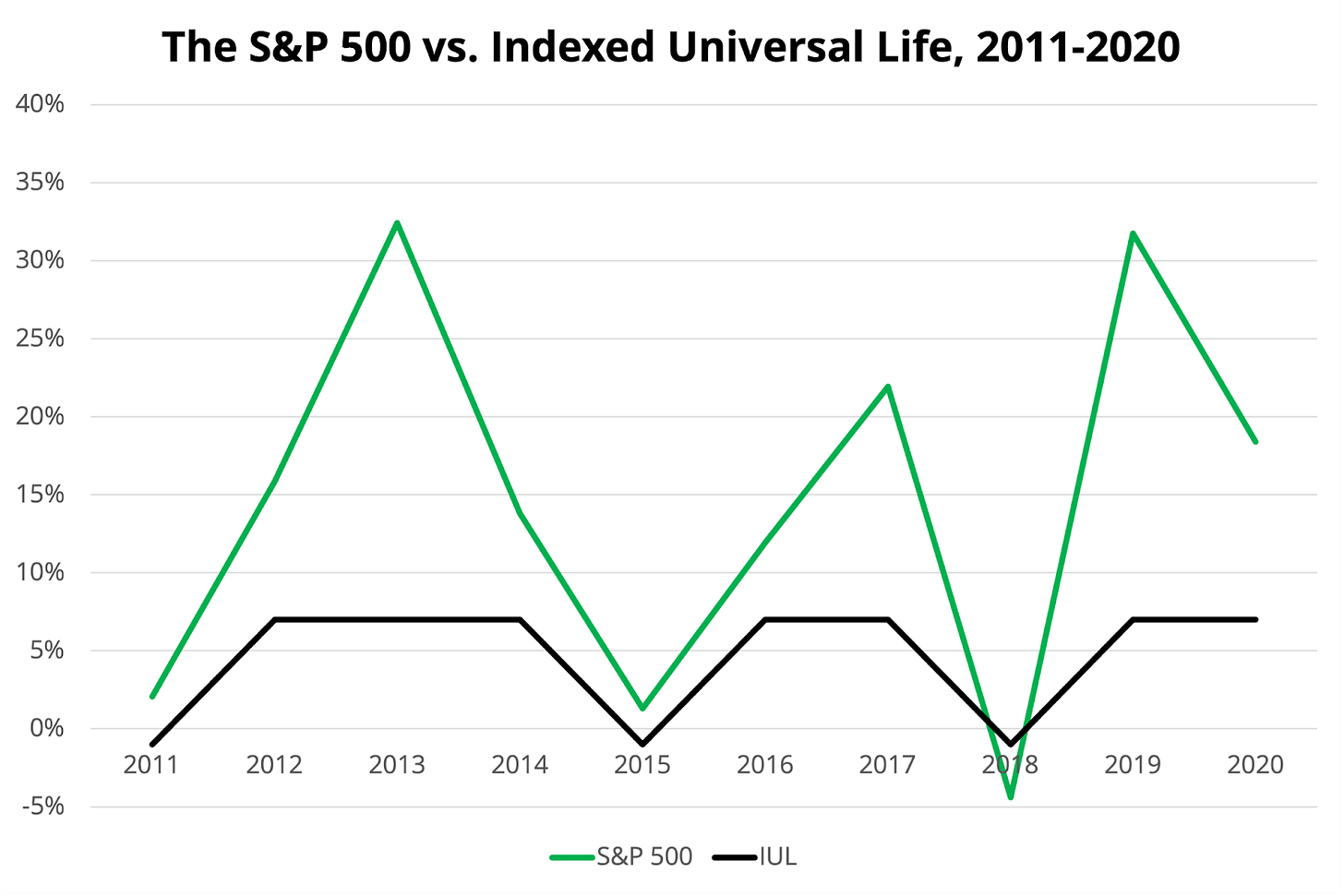All Categories
Featured
Table of Contents
Do they compare the IUL to something like the Vanguard Total Stock Market Fund Admiral Shares with no load, a cost proportion (ER) of 5 basis points, a turnover proportion of 4.3%, and a phenomenal tax-efficient document of distributions? No, they compare it to some awful proactively handled fund with an 8% load, a 2% ER, an 80% turn over ratio, and a terrible record of temporary capital gain circulations.
Mutual funds usually make yearly taxable distributions to fund owners, also when the value of their fund has dropped in worth. Shared funds not only require income reporting (and the resulting annual taxation) when the mutual fund is rising in worth, yet can additionally enforce earnings tax obligations in a year when the fund has actually dropped in worth.
That's not how mutual funds work. You can tax-manage the fund, collecting losses and gains in order to minimize taxed distributions to the financiers, but that isn't somehow mosting likely to change the reported return of the fund. Only Bernie Madoff kinds can do that. IULs prevent myriad tax traps. The ownership of common funds might need the mutual fund owner to pay estimated taxes.

IULs are easy to place so that, at the proprietor's fatality, the recipient is exempt to either earnings or inheritance tax. The exact same tax reduction methods do not function almost as well with shared funds. There are numerous, usually costly, tax obligation traps associated with the timed purchasing and marketing of common fund shares, catches that do not apply to indexed life Insurance.
Possibilities aren't extremely high that you're mosting likely to be subject to the AMT due to your shared fund distributions if you aren't without them. The remainder of this one is half-truths at ideal. While it is real that there is no earnings tax due to your heirs when they acquire the profits of your IUL plan, it is also real that there is no earnings tax obligation due to your successors when they inherit a mutual fund in a taxable account from you.
Equity Indexed Life
There are much better methods to prevent estate tax obligation issues than getting financial investments with reduced returns. Common funds may create earnings taxation of Social Security benefits.

The growth within the IUL is tax-deferred and might be taken as free of tax earnings through lendings. The plan owner (vs. the shared fund manager) is in control of his/her reportable revenue, therefore enabling them to lower or also eliminate the tax of their Social Protection benefits. This is terrific.
Right here's another minimal issue. It holds true if you buy a common fund for say $10 per share right before the distribution day, and it distributes a $0.50 distribution, you are then mosting likely to owe taxes (most likely 7-10 cents per share) despite the truth that you have not yet had any gains.
In the end, it's really about the after-tax return, not just how much you pay in tax obligations. You're also most likely going to have even more cash after paying those tax obligations. The record-keeping requirements for having mutual funds are substantially much more intricate.
With an IUL, one's records are maintained by the insurance provider, copies of annual statements are sent by mail to the proprietor, and distributions (if any kind of) are amounted to and reported at year end. This one is also sort of silly. Obviously you should maintain your tax obligation documents in case of an audit.
Iul Investment Calculator
All you have to do is shove the paper right into your tax folder when it shows up in the mail. Rarely a reason to acquire life insurance policy. It resembles this guy has never purchased a taxable account or something. Mutual funds are typically component of a decedent's probated estate.
Furthermore, they undergo the delays and expenses of probate. The profits of the IUL plan, on the other hand, is always a non-probate circulation that passes beyond probate straight to one's called beneficiaries, and is therefore exempt to one's posthumous lenders, undesirable public disclosure, or comparable hold-ups and costs.
Medicaid incompetency and life time income. An IUL can provide their proprietors with a stream of revenue for their whole life time, regardless of just how long they live.

This is advantageous when organizing one's events, and converting assets to revenue before a nursing home confinement. Mutual funds can not be transformed in a similar fashion, and are generally considered countable Medicaid properties. This is one more stupid one supporting that bad people (you know, the ones that need Medicaid, a federal government program for the bad, to pay for their assisted living facility) should make use of IUL as opposed to common funds.
Term Vs Universal Life
And life insurance policy looks horrible when compared rather versus a pension. Second, people that have cash to get IUL above and beyond their pension are going to have to be terrible at handling money in order to ever before qualify for Medicaid to pay for their nursing home expenses.
Chronic and incurable health problem biker. All policies will permit an owner's simple accessibility to cash money from their plan, often forgoing any surrender penalties when such people endure a significant ailment, require at-home care, or come to be constrained to a nursing home. Shared funds do not give a comparable waiver when contingent deferred sales fees still put on a shared fund account whose proprietor needs to market some shares to money the expenses of such a stay.
What Is Better Term Or Universal Life Insurance
You get to pay even more for that benefit (biker) with an insurance plan. Indexed universal life insurance coverage supplies death benefits to the recipients of the IUL proprietors, and neither the owner nor the recipient can ever before lose cash due to a down market.
Currently, ask yourself, do you in fact need or desire a fatality advantage? I certainly don't require one after I get to monetary self-reliance. Do I desire one? I expect if it were inexpensive sufficient. Of program, it isn't inexpensive. On average, a purchaser of life insurance policy pays for real cost of the life insurance coverage benefit, plus the prices of the plan, plus the earnings of the insurance provider.
Iul Life Insurance Cost
I'm not totally certain why Mr. Morais tossed in the entire "you can't lose cash" once more here as it was covered quite well in # 1. He just intended to repeat the best selling factor for these things I mean. Once more, you do not lose small bucks, yet you can shed real dollars, along with face severe opportunity expense due to reduced returns.

An indexed universal life insurance policy plan proprietor may trade their policy for a totally various plan without causing earnings tax obligations. A mutual fund owner can stagnate funds from one shared fund business to one more without marketing his shares at the previous (therefore triggering a taxable event), and redeeming brand-new shares at the latter, usually based on sales charges at both.
While it holds true that you can trade one insurance coverage for another, the factor that people do this is that the very first one is such an awful policy that even after getting a brand-new one and undergoing the very early, unfavorable return years, you'll still come out ahead. If they were marketed the best plan the very first time, they shouldn't have any need to ever trade it and go via the very early, adverse return years once more.
Latest Posts
Index Universal Life Insurance Companies
Best Equity Indexed Universal Life Insurance
Death Benefit Options Universal Life